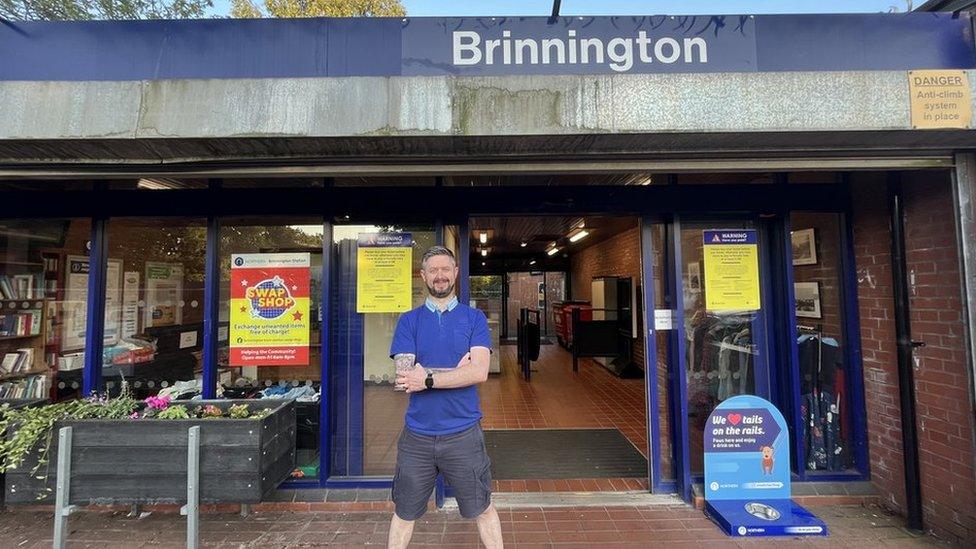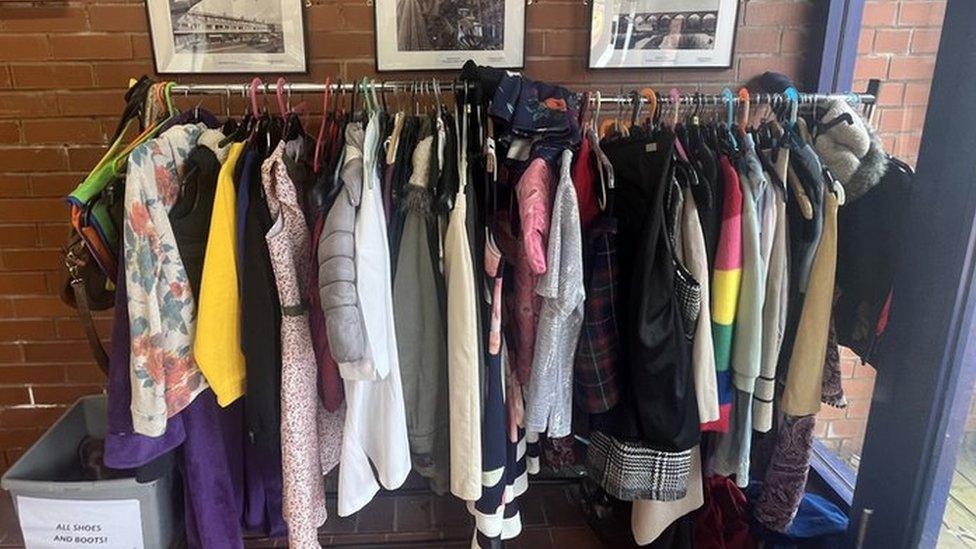Brinnington: The station swap shop tackling anti-social behaviour
- Published

Mr Hall says he has seen fewer anti-social incidents since the swap shop opened
In 2022, Stewart Hall noticed anti-social behaviour outside the railway station where he works was getting out of hand.
"I knew that it was plagued by kids... non-stop trouble and a lot of staff refused to work here," he says.
His station is in Brinnington in Stockport, an area which a local council report at the time, external said ranked within the most deprived 1% nationally.
Mr Hall's response was to do something to change things locally.
So in April 2022, he and co-worker Darin Astbury opened a swap shop.
He says it was set up as a place where people can donate and pick up things for free, not just clothes and toys but everything from curtains and prams to food.
"The aim was to help people and... change people's attitudes towards the station as well.
"And we saw that there was a need for something like this in the area."

The swap shop takes donations of homeware, clothes and food
He says setting up the swap shop has not just benefited the community, but also his mental health.
"The way I see it is it just takes that little wave or smile [and it] changes someone's day."
The shop has grown since it first opened and is now run by about 20 volunteers.
He says it has become "like a community hub and people come to chat".
"Some of them come in for an hour a day. Some of them come in for 10 minutes a day."
'A significant priority'
Earlier in the year, the government announced a series of policies to tackle anti-social behaviour in England and Wales.
Hot spot policing and what was called "swift and visible justice" will be trialled in 16 areas, before being rolled out more widely in 2024.
The community safety organisation Resolve, external commissioned a YouGov poll asking more than 2,000 people in Britain about their experiences of anti-social behaviour.
They found that more than half of those surveyed said that one of their concerns was groups of youth causing trouble on the streets - and 47% said vandalism, criminal damage and graffiti was a big problem in their areas.
Resolve's chief executive Rebecca Bryant, who was previously Manchester City Council's lead on crime and disorder, says anti-social behaviour has always been an issue.
"It was and still is a significant priority," she says.
"When I was head of service, it was a well-funded team to tackle this issue over the city of Manchester."

She says the government's plans are "a good start, but we need to focus on people who aren't engaged"
She says the government's plans are "a good start, but we need to focus on people who aren't engaged in youth clubs and services through detached work"
"There needs to be an individually tailored approach," she adds.
"Anti-social behaviour isn't low-level, more often than not it's a precursor to serious crime, it's a career path."
Mr Hall says there has been a reduction in anti-social behaviour near the station and believes it is linked to the swap shop.
"You see people coming in every day saying, 'Have you got any food? Is there anything in?'
"Even if it's just a tin of tomato soup, it's made their day, they've eaten when they otherwise can't."
"That may be a massive factor in our downturn in anti-social behaviour at the station.
"People are respecting us because... you don't bite the hand that feeds you."

Why not follow BBC North West on Facebook, external, Twitter, external and Instagram, external? You can also send story ideas to northwest.newsonline@bbc.co.uk, external